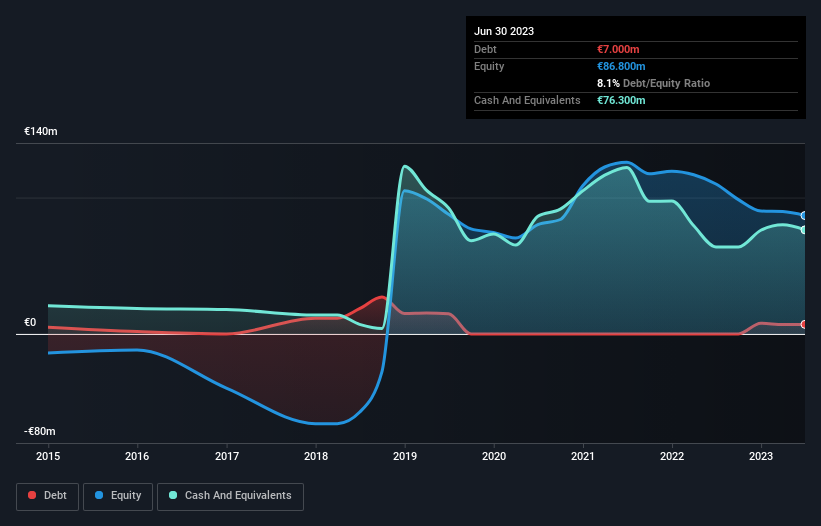
Warren Buffett famously said, 'Volatility is far from synonymous with risk.' When we think about how risky a company is, we always like to look at its use of debt, since debt overload can lead to ruin. We can see that Westwing Group SE (ETR:WEW) does use debt in its business. But is this debt a concern to shareholders?
What Risk Does Debt Bring?
Debt assists a business until the business has trouble paying it off, either with new capital or with free cash flow. Part and parcel of capitalism is the process of 'creative destruction' where failed businesses are mercilessly liquidated by their bankers. However, a more common (but still painful) scenario is that it has to raise new equity capital at a low price, thus permanently diluting shareholders. Of course, debt can be an important tool in businesses, particularly capital heavy businesses. The first thing to do when considering how much debt a business uses is to look at its cash and debt together.
View our latest analysis for Westwing Group
How Much Debt Does Westwing Group Carry?
As you can see below, at the end of June 2023, Westwing Group had €7.00m of debt, up from none a year ago. Click the image for more detail. However, its balance sheet shows it holds €76.3m in cash, so it actually has €69.3m net cash.

How Healthy Is Westwing Group's Balance Sheet?
According to the last reported balance sheet, Westwing Group had liabilities of €88.3m due within 12 months, and liabilities of €41.9m due beyond 12 months. Offsetting these obligations, it had cash of €76.3m as well as receivables valued at €10.0m due within 12 months. So it has liabilities totalling €43.9m more than its cash and near-term receivables, combined.
This deficit isn't so bad because Westwing Group is worth €159.1m, and thus could probably raise enough capital to shore up its balance sheet, if the need arose. But it's clear that we should definitely closely examine whether it can manage its debt without dilution. While it does have liabilities worth noting, Westwing Group also has more cash than debt, so we're pretty confident it can manage its debt safely. There's no doubt that we learn most about debt from the balance sheet. But ultimately the future profitability of the business will decide if Westwing Group can strengthen its balance sheet over time. So if you want to see what the professionals think, you might find this free report on analyst profit forecasts to be interesting.
Over 12 months, Westwing Group made a loss at the EBIT level, and saw its revenue drop to €421m, which is a fall of 9.7%. That's not what we would hope to see.
So How Risky Is Westwing Group?
Although Westwing Group had an earnings before interest and tax (EBIT) loss over the last twelve months, it generated positive free cash flow of €20m. So although it is loss-making, it doesn't seem to have too much near-term balance sheet risk, keeping in mind the net cash. Until we see some positive EBIT, we're a bit cautious of the stock, not least because of the rather modest revenue growth. When we look at a riskier company, we like to check how their profits (or losses) are trending over time. Today, we're providing readers this interactive graph showing how Westwing Group's profit, revenue, and operating cashflow have changed over the last few years.
If, after all that, you're more interested in a fast growing company with a rock-solid balance sheet, then check out our list of net cash growth stocks without delay.
Valuation is complex, but we're here to simplify it.
Discover if Westwing Group might be undervalued or overvalued with our detailed analysis, featuring fair value estimates, potential risks, dividends, insider trades, and its financial condition.
Access Free AnalysisHave feedback on this article? Concerned about the content? Get in touch with us directly. Alternatively, email editorial-team (at) simplywallst.com.
This article by Simply Wall St is general in nature. We provide commentary based on historical data and analyst forecasts only using an unbiased methodology and our articles are not intended to be financial advice. It does not constitute a recommendation to buy or sell any stock, and does not take account of your objectives, or your financial situation. We aim to bring you long-term focused analysis driven by fundamental data. Note that our analysis may not factor in the latest price-sensitive company announcements or qualitative material. Simply Wall St has no position in any stocks mentioned.
About XTRA:WEW
Excellent balance sheet and good value.
Similar Companies
Market Insights
Community Narratives




